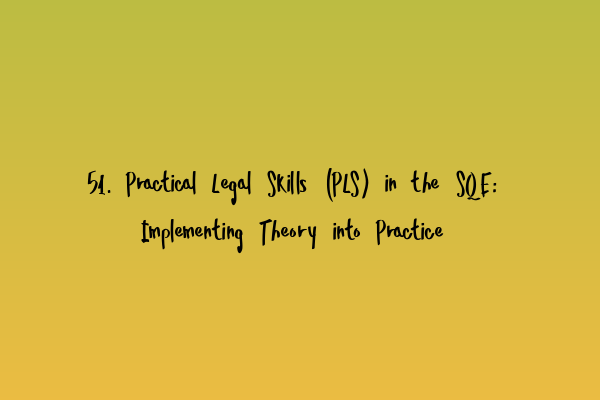Practical Legal Skills (PLS) in the SQE: Implementing Theory into Practice
As a aspiring solicitor, passing the Solicitors Qualifying Examination (SQE) is a major milestone in your journey to becoming qualified. The SQE assesses your knowledge and understanding of various legal topics, but it also places a strong emphasis on practical legal skills (PLS).
PLS is a crucial aspect of the SQE as it tests your ability to apply the theoretical knowledge you have acquired throughout your studies into practical scenarios. It evaluates your skills in areas such as legal research, writing, advocacy, and client interviewing. These skills are not only fundamental to the legal profession but also essential for providing quality legal services to clients.
So, how can you effectively implement theory into practice and excel in the PLS component of the SQE? Let’s explore some key strategies and techniques.
1. Understand the Assessment Criteria
Before delving into practicing PLS, it is important to thoroughly understand the assessment criteria for each skill. The Solicitors Regulation Authority (SRA) provides detailed guidance on the specific competencies and behaviors expected from aspiring solicitors. Familiarize yourself with these criteria to ensure you focus your preparation in the right areas.
Additionally, it is crucial to understand the format and structure of the PLS assessments. This includes knowing the length of each assessment, the types of questions or tasks you may encounter, and any specific guidelines provided. Having a clear understanding of what is expected of you will help you tailor your preparation and optimize your performance on exam day.
2. Practice, Practice, Practice
There is no substitute for practice when it comes to honing your practical legal skills. The more you practice, the more confident and competent you will become in applying legal theory to real-life scenarios.
Start by familiarizing yourself with past PLS questions from previous iterations of the exam. These questions will give you an idea of the level of difficulty and the types of scenarios you may encounter. You can find a selection of SQE 1 practice exam questions here.
Another valuable resource for practice is SQE 1 practice mocks, such as FLK1 and FLK2. These mocks simulate the real exam environment and provide you with an opportunity to assess your performance under timed conditions. You can access SQE 1 practice mocks here.
Additionally, consider enrolling in SQE 2 preparation courses that offer intensive practice sessions and mock assessments. These courses will help you refine your practical skills and provide valuable feedback from experienced professionals. You can explore SQE 2 preparation courses here.
3. Develop Strong Legal Research Skills
Legal research is a fundamental skill for every lawyer. The ability to locate and analyze relevant legal authorities is essential for providing accurate and reliable advice to clients.
When practicing your legal research skills, ensure you are utilizing reliable and up-to-date sources. Online databases such as LexisNexis and Westlaw can be excellent resources for accessing legal materials.
Developing strong research skills also involves understanding how to systematically approach a research task. Take the time to familiarize yourself with various search techniques, such as using Boolean operators and utilizing advanced search functions. These techniques will help you efficiently locate relevant legal authorities.
4. Focus on Clear and Concise Communication
Effective communication is essential in the legal profession. As part of the PLS assessments, you will be evaluated on your ability to communicate legal concepts and advice clearly and succinctly.
Practice writing concise and coherent legal memos, letters, and emails. Pay attention to the structure and organization of your written work, ensuring that your arguments are logical and well-supported by legal authorities.
In addition to written communication, focus on developing your oral advocacy skills. Practice presenting legal arguments in a clear and persuasive manner. Consider participating in mock trials or moot court competitions to gain practical experience in oral advocacy.
5. Enhance Client Interviewing Skills
Client interviewing is a critical skill for solicitors. Being able to effectively gather information from clients, identify their legal issues, and provide appropriate advice is key to delivering quality legal services.
Practice conducting mock client interviews to improve your skills in this area. Pay attention to active listening, empathy, and asking relevant follow-up questions. Develop your ability to distill complex legal concepts into simple and easily understood explanations for clients.
Remember, the goal of the client interview is to establish rapport and trust with the client while obtaining the necessary information to provide accurate legal advice.
Conclusion
The Practical Legal Skills (PLS) component of the SQE plays a vital role in assessing your ability to apply legal theory into practice. By understanding the assessment criteria, practicing diligently, developing strong research and communication skills, and enhancing your client interviewing abilities, you can excel in the PLS assessments and pave the way to becoming a qualified solicitor.
For more information on SQE preparation courses and exam dates, visit the following links:
